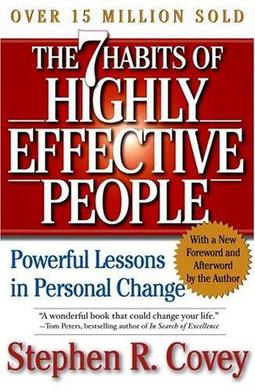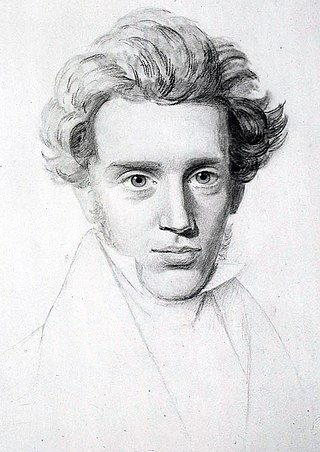
The Golden Rule is the principle of treating others as one would want to be treated by them. It is sometimes called an ethics of reciprocity, meaning that you should reciprocate to others how you would like them to treat you. Various expressions of this rule can be found in the tenets of most religions and creeds through the ages.

The 7 Habits of Highly Effective People, first published in 1989, is a business and self-help book written by Stephen R. Covey.

Either/Or is the first published work of Danish philosopher Søren Kierkegaard. It appeared in two volumes in 1843 under the pseudonymous editorship of Victor Eremita. It outlines a theory of human existence, marked by the distinction between an essentially hedonistic, aesthetic mode of life and the ethical life, which is predicated upon commitment.
Metafiction is a form of fiction that emphasizes its own narrative structure in a way that inherently reminds the audience that they are reading or viewing a fictional work. Metafiction is self-conscious about language, literary form, and story-telling, and works of metafiction directly or indirectly draw attention to their status as artifacts. Metafiction is frequently used as a form of parody or a tool to undermine literary conventions and explore the relationship between literature and reality, life, and art.

David James Pelzer is an American author of several autobiographical and self-help books. His 1995 memoir of childhood abuse, A Child Called "It": One Child's Courage to Survive, was listed on The New York Times Best Seller list for several years, and in 5 years had sold at least 1.6 million copies. The book brought Pelzer fame, and has also been a source of controversy, with accusations of several events being fabricated coming from both family members and journalists.

Eknath Easwaran was an Indian-born spiritual teacher, author and translator and interpreter of Indian religious texts such as the Bhagavad Gita and the Upanishads.
The Barnum effect, also called the Forer effect or, less commonly, the Barnum–Forer effect, is a common psychological phenomenon whereby individuals give high accuracy ratings to descriptions of their personality that supposedly are tailored specifically to them, yet which are in fact vague and general enough to apply to a wide range of people. This effect can provide a partial explanation for the widespread acceptance of some paranormal beliefs and practices, such as astrology, fortune telling, aura reading, and some types of personality tests.
How to Live on Twenty-four Hours a Day is a short self-help book "about the daily organization of time" by novelist Arnold Bennett. Written originally as a series of articles in the London Evening News in 1907, it was published in book form in 1908. Aimed initially at "the legions of clerks and typists and other meanly paid workers caught up in the explosion of British office jobs around the turn of the [twentieth] century", it was one of several "pocket philosophies" by Bennett that "offered a strong message of hope from somebody who so well understood their lives". The book was especially successful in the US, where Henry Ford bought 500 copies to give to his friends and employees. Bennett himself said that the book "has brought me more letters of appreciation than all my other books put together".
Louise Lynn Hay was an American motivational author, professional speaker and AIDS advocate. She authored several New Thought self-help books, including the 1984 book You Can Heal Your Life, and founded Hay House publishing.

The philosophy of Søren Kierkegaard has been a major influence in the development of 20th-century philosophy, especially existentialism and postmodernism. Søren Kierkegaard was a 19th-century Danish philosopher who has been labeled by many as the "Father of Existentialism", although there are some in the field who express doubt in labeling him an existentialist to begin with. His philosophy also influenced the development of existential psychology.
A self-help book is one that is written with the intention to instruct its readers on solving personal problems. The books take their name from Self-Help, an 1859 best-seller by Samuel Smiles, but are also known and classified under "self-improvement", a term that is a modernized version of self-help. Self-help books moved from a niche position to being a postmodern cultural phenomenon in the late twentieth century.

Dr. Orison Swett Marden (1848–1924) was an American inspirational author who wrote about achieving success in life and founded SUCCESS magazine in 1897. His writings discuss common-sense principles and virtues that make for a well-rounded, successful life. Many of his ideas are based on New Thought philosophy.
Intentional living is any lifestyle based on an individual or group's conscious attempts to live according to their values and beliefs. These can include lifestyles based on religious, political or ethical values, as well as for self-improvement.
Help Yourself may refer to:

The Power of Positive Thinking: A Practical Guide to Mastering the Problems of Everyday Living is a 1952 self-help book by American minister Norman Vincent Peale. It provides anecdotal "case histories" of positive thinking using a biblical approach, and practical instructions which were designed to help the reader achieve a permanent and optimistic attitude. These techniques usually involved affirmations and visualizations. Peale claimed that such techniques would give the reader a higher satisfaction and quality of life. The book was negatively reviewed by scholars and health experts, but was popular among the general public and has sold well.

The Happiness Hypothesis: Finding Modern Truth in Ancient Wisdom is a 2006 book written by American social psychologist Jonathan Haidt. In it, Haidt poses several "Great Ideas" on happiness espoused by thinkers of the past—such as Plato, Buddha and Jesus—and examines them in the light of contemporary psychological research, extracting from them any lessons that still apply to our modern lives. Central to the book are the concepts of virtue, happiness, fulfillment, and meaning.

Scott John Hutchison was a Scottish singer, songwriter, guitarist and artist. He was the founding member and primary songwriter of the indie rock band Frightened Rabbit, with whom he recorded five studio albums, and created the artwork for each release.
Mel Thompson is an English writer and philosopher. He was formerly a teacher, editor and A level examiner.

Prudence Margaret Burch, known professionally as Vidyamala Burch, is a mindfulness teacher, writer, and co-founder of Breathworks, an international mindfulness organization known particularly for developing mindfulness-based pain management (MBPM). The British Pain Society has recognized her "outstanding contribution to the alleviation of pain", and in 2019, 2020, 2021 and 2022 she was named on the Shaw Trust Power 100 list of the most influential disabled people in the UK. Burch's book Mindfulness for Health won the British Medical Association's 2014 Medical Books Award in the Popular Medicine category.

Shen is the pen name of cartoonist Andrew Tsyaston, the creator of the comic series Owlturd, Shen Comix, and Bluechair, and the co-creator of Live With Yourself. Shen Comix has 2 million followers on Instagram while Bluechair has 1.2 million subscribers on Webtoon.











